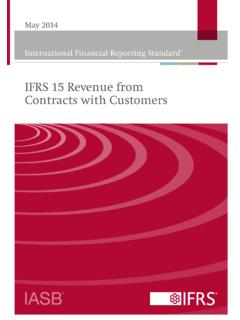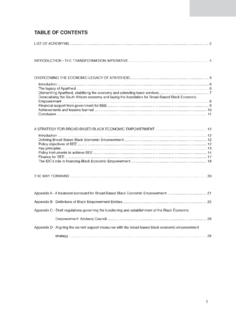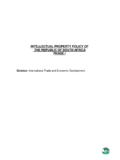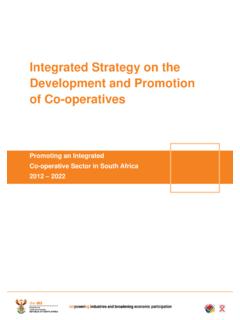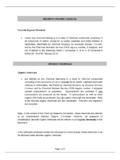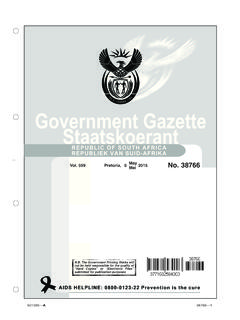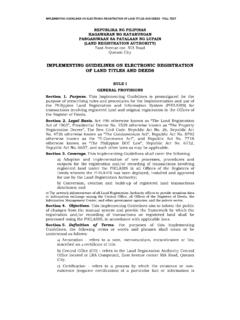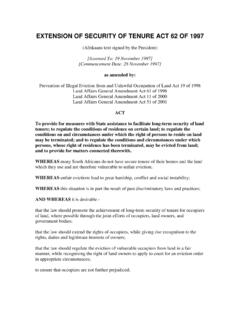Transcription of Black Industrialists Guidelines
1 1 2 Contents 1. Preamble 3 2. Services delivered by the dti 3 3. Description of the BIS 3 4. Mandatory conditions 5 5. Grant Offering 7 6. Non-Eligible Applicants 7 7. BIS Qualifying Costs 7 8. Non-Qualifying Costs 10 9. Grant Calculation 10 10. Grant Disbursements 11 11. Monitoring and Evaluation 11 13. Legal Conditions 12 14 Decision Review Process 13 14 Application form 14 3 1. Preamble The purpose of this document is to provide Guidelines for the Black Industrialists Scheme (BIS), a grant programme of the Black Industrialists Policy that aims to unlock the potential within Black Industrialists that operate in the South African economy through deliberate, targeted and well-defined financial and non-financial interventions.
2 The Guidelines set out herein are intended to enable Black Industrialists to present their applications to the Department of Trade and Industry (the dti) and provide a framework for the Black Industrialists Financing Forum (BIFF) to evaluate such applications. The granting of the incentive will only be for those projects that meet the strategic objectives of the Black Industrialists Policy, as advanced by these Guidelines . The Guidelines for the BIS grant may be amended from time to time, as deemed necessary by the dti. These amendments will be published on the dti website and be of immediate effect upon publication. Where the Guidelines lend themselves to varying interpretations or do not deal with specific subject matter, the interpretation of the dti must be requested and such interpretation will be decisive and final, and a new version/ interpretation note of the Guidelines may be published on the dti website.
3 Approval of applications will be subject to the availability of funds and compliance with the relevant provisions of the Public Finance Management Act (PFMA). 2. Services delivered by the dti No fees or charges are levied by the dti for the processing or evaluation of any BIS applications or claims. Applicants are welcome to contact the dti directly for assistance in completing the assessment form. the dti does not make use of any agents or consultants to promote the BIS grant and will not be accountable for any service delivered or failure thereof by any other person or consultant who facilitates the assessment form on behalf of the applicants.
4 3. Description of the BIS The objectives of the BIS are to: a. Accelerate the quantitative and qualitative increase and participation of Black Industrialists in the national economy, selected manufacturing sectors and value chains; as reflected by their contribution to growth, investment, exports and employment; and b. Create multiple and diverse pathways and instruments for Black Industrialists to enter strategic and targeted manufacturing sectors and value chains. 4 A Black industrialist refers to a juristic person, which includes co-operatives incorporated in terms of the Companies Act, 2008 (as amended) that are owned by Black South Africans as defined by the Broad-Based Black Economic Empowerment (B-BBEE) Act, that creates and owns value-adding industrial capacity and provides long-term strategic and operational leadership to a business.
5 A Black industrialist can be a natural person. The following are characteristics of a Black industrialist: a. high levels of ownership (>50%); b. dominant Black ownership and management control may be considered for projects that are deemed strategic by the dti, but may need to include other shareholders to attract relevant skills, finance and scale-up the investment opportunities; c. exercises control over the business; d. takes personal risk in the business; e. does business in the manufacturing sector with particular reference to IPAP focus areas; and f. makes a long-term commitment to the business and is a medium- to long-term investor Black people refer to African, Coloured and Indian persons who are natural persons and: a.
6 Are citizens of the Republic of South Africa by birth or descent; or b. Are citizens of the Republic of South Africa by naturalisation before the commencement date of the Constitution of the Republic of South Africa Act of 1993; or c. Became citizens of the Republic of South Africa after the commencement date of the Constitution of the Republic of South Africa Act of 1993, but who, had it not been for the Apartheid policy, would have qualified for naturalisation before then. d. The definition of Black people now includes South African Chinese people as per the Pretoria High Court ruling on 18 June 2008. The key focus areas of the programme will be on the following productive sectors: a.
7 Blue/ocean economy, including vessel building and repair b. Oil and gas c. Clean technology and energy d. Mineral beneficiation e. Aerospace, rail and automotive components f. Industrial Infrastructure g. Information communication technologies h. Agro-processing i. Clothing, textiles/leather and footwear j. Pulp, paper and furniture k. Chemicals, pharmaceuticals and plastics l. Nuclear m. Manufacturing-related logistics n. Designated sectors for localisation 5 These sectors will be reviewed from time to time, in line with government priorities. Interpretation of the support areas within each sector will be at the discretion of the dti.
8 Other manufacturing activities may be considered based on economic impact in terms of job creation, geographic spread and strengthening supply chains. 4. Mandatory conditions The applicant must: Be a registered legal entity in South Africa in terms of the Companies Act, 1973 (as amended) or the Companies Act, 2008 (as amended); the Close Corporations Act, 1984 (as amended) or the Co-operatives Act, 2005 (as amended). Be a taxpayer in good standing and must provide a valid tax clearance certificate at assessment and before the grant is disbursed. Be involved in starting a new operation or in expanding or upgrading an existing operation or the acquisition of an existing business/operation.
9 Be aligned to the productive sectors of the economy within the identified sectors as outlined in section above. Have more than 50% shareholding and management control. Have a valid B-BBEE certificate of compliance. Be directly involved in the day-to-day running of the operation and must have requisite expertise in the sector. Have a project with a minimum investment of R30 million. Undertake a project that should result in securing or increasing direct employment. 6 In addition to the mandatory conditions, the Black industrialist will have to achieve at least four of the following criteria to participate in the programme: TABLE 1: Economic Benefit Criteria Criteria Description Points A.
10 Employment Securing/retaining or increasing direct employment 1 B. Market Share New business/operations: Securing market share for the entity; or 1 Existing business/operations: Increase market share for the entity C. Quality Improvement Reduction of relative prices and/or increasing the quality of products to consumers 1 D. Green Technology and Resource Efficiency Improvements Savings or better use of energy or materials and/or cleaner production improvement and/or waste management improvement and/or water usage improvement and/or use of renewable energy 1 E. Localisation Increasing the localisation of production activities (diversification and exports) 1 F.

